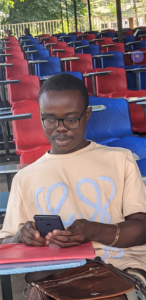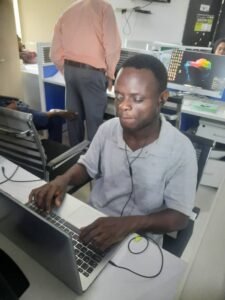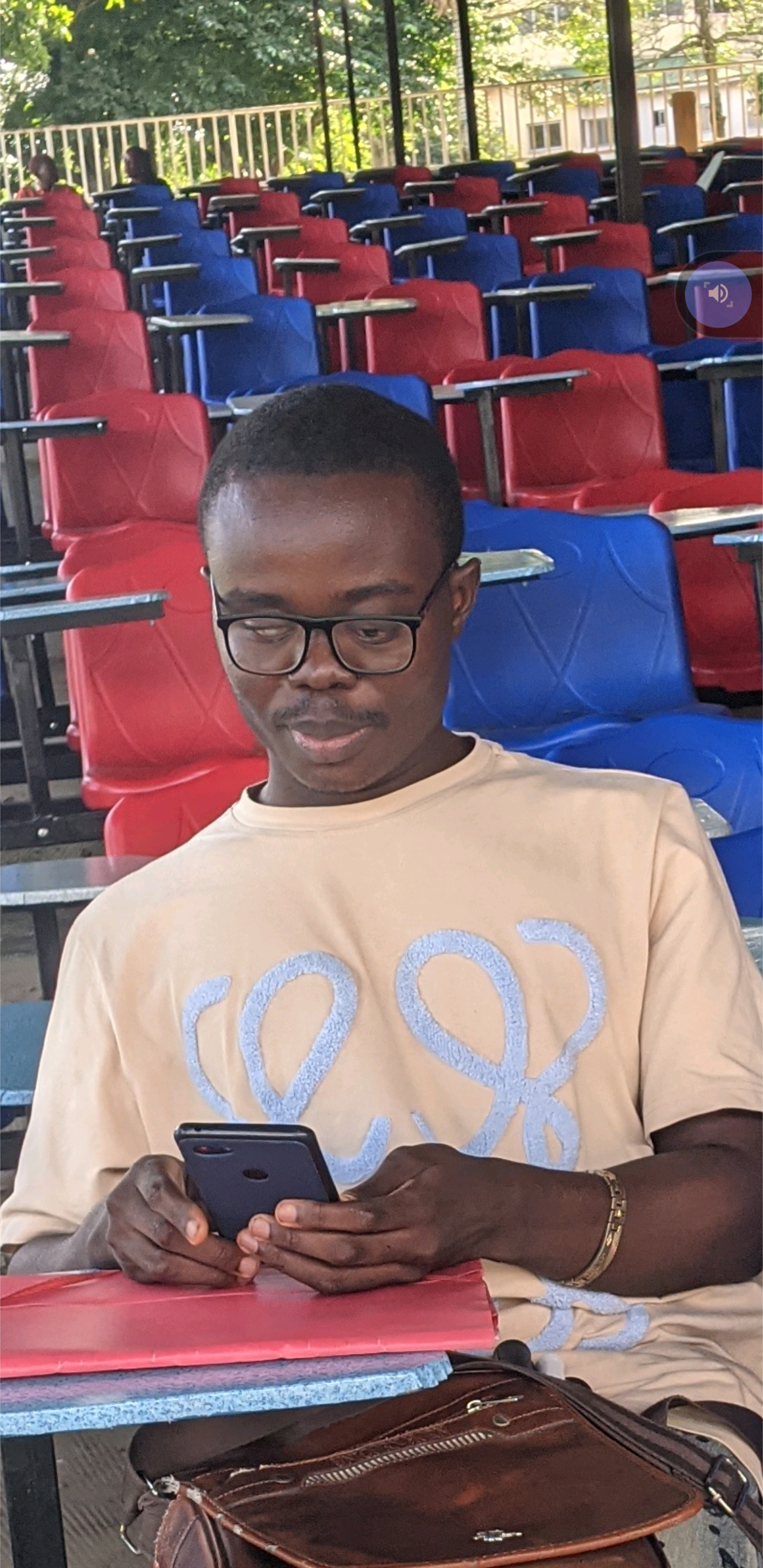
Using smart phones and other digital devices lie at the heart of many challenges encountered by blind people in Africa. This is because in a world driven by technology, they too want access to the global village. In Cameroon, like elsewhere in Africa, using a smartphone as a visually impaired person is not only challenging, it is also blocked by numerous stereotypes.
Fraisnel Bayuga grew up struggling to break the myth of what had become the new normal that a person with visual impairment like himself could not use a smart device. Born as a pair of twins in 1999, his mother would discover in a dark night a year later, with the aid of a bush lamp, that a strange liquid was oozing from his eyes, and that would mark the beginning of his gradual descend to blindness.
“They took me from hospital to hospital, from church to church,” he said. “
At one of the hospitals, a specialist offered to operate my eyes, but he said it was a fifty-fifty, meaning I could either see perfectly thereafter, or completely lose the little vision I possessed. My parents were too afraid to take the risk,” he added.
Although numerous advancements have been made towards enabling visually impaired persons to access and use smartphones, a vast majority of them are yet unaware of such possibilities. At the forefront of these technologies is Google Talkback.
How Talkback works for Blind users
It is an accessibility product for the Android Operating System that helps blind and visually impaired users to interact with their devices. An open source software, it uses spoken words, vibrations and other audible feedback mechanisms to permit users know actions performed on the screen. This enables users to navigate using gestures like swipes, taps, and double-taps, instead of visual cues. When activated, for examples, swiping right might move focus to the next item on screen, and double tapping might activate a button.
According to Accessible Android, Talkback was developed shortly after the introduction of Android Cupcake (1.5,) and first operated on the Android Donut (1.6). It has since become an integral part of Android, with Google making it part of its larger accessibility suite in 2017.
Fraisnel’s long struggle
Growing up as a child in the same home with his twin sister, it was quite a tempting experience to only hear and enjoy sounds from games her pair played on smartphones. Fraisnel too yearned to play games and watch videos But his sight always seemed to be a barrier. Little did the boy know he would later require access to smart devices for his studies as well.
At 14, the journey looked ready and Fraisnel too was set for the new challenge. This was in 2014. He gained admission into the Rehabilitation Institute for the Blind (RIB) Buea, Southwest Cameroon, and his takeoff point was learning the writing and reading of Braille, a writing widely used by blind and partially sighted people around the world.
“I started seeing how blind people like me were doing things independently, and some even using phones. That marked the start of my adventure into the world of accessible technologies,” he said happily.
However, the journey into Google Talkback didn’t take a day, although using a smartphone was never a rocket science. What was lacking was the awareness, and perhaps, access to a smart gadget.
“I kept wondering whether I could use a smart phone.” By 2018, he had learned how to use a computer with the aid of JAWS, another screen-reading software, and this enabled him to research the possibilities of using a smartphone through the internet.
New dawn for Fraisnel
Fraisnel, certainly, is among a few lucky blind people in Africa to have access to a smart device at the age of 19. Some are 50 and above, but are yet to be convinced a visually impaired person can use a smart phone. In 2019, the then teenager bought his first Android phone, an ItelA56. That was when he started exploring Google Talkback.
“Talkback has really helped me,” he intimated. “It has enhanced my level of independence, especially because I can now access certain things without necessarily turning to the aid of a sighted individual.”
In a country where textbooks are rarely Brailled, Fraisnel believes his education would have been almost impossible, if not for Talkback, which allows him to access information on apps, websites, and documents through spoken descriptions.
Now a second year undergraduate student of Political Science and Comparative Politics in the University of Buea, Fraisnel opened up to DNA that Google Talkback has been at the centre of his educational success.
“It is an accelerator of inclusive education and digital inclusion,” he asserted.
FraisnelBayuga, though, is not the youngest African to have access to a smartphone. Elvira Nchenze, a 17-year-old blind High School student of Bilingual Grammar School Buea, says Talkback has rendered her education seamless.
“It reads everything for me,” she explained joyfully. Born blind in 2007, Elvira never believed, growing up, that she would one day use a phone, not to talk of a smartphone. “In the last one year since I started using it, it’s been my eyes, allowing me to do everything, including using mobile money, sending messages, making calls and browsing social media,” she told DNA.
Challenges faced by Users
While thousands of blind African still wait to use a smartphone due to lack of awareness, the few opportune to use Talkback say, the app is not without challenges. They say until the challenges are tackled, their access to the full world of technology would remain impeded. “There are certain apps I cannot access using Talkback. It’s just not compatible,” Elvira said.
● If there’s someone in the continent who understands the challenges perfectly, its Nigerian journalist and digital accessibility advocate, Ayoola Efunkoya, who is also visually impaired. Having used the application since the days of Android Gingerbread (2.3,) he says even though the app is under continuous development, it would be long before the limitations faced by visually impaired users in Africa are reduced. “Many smartphones with good accessibility features remain expensive for the visually impaired,” he said. “Premium brands known for accessibility are often out of reach, forcing users towards options with potentially weaker support

●
The Bigger Picture
Talkback is developed and updated regularly, leading many visually impaired Africans to hope that the full potentials of the technology would one day be felt across the continent. But for that day to come, Ayoola believes it would take more than the efforts of Google alone. “Deeper research by Google into the specific needs and challenges faced by the African blind community is essential,” he explained. To him, sustainable partnerships with governments, employees, telecommunication companies, manufacturers and disability organizations are crucial to ease financing, promote universal design, and train African visually impaired users. “Google’s commitment to developing African-centered solutions that address the specific needs of the blind community will prove instrumental in ensuring equitable access to technology and its empowering potential,” he said.
An enlightened leader of persons with visual impairment, Kesah Princely, who is DNA’s Managing Editor and a Google Accessibility Influencer, says the future looks bright. “Google certainly now understands the need to extend its accessibility coverage to Africa because the continent provides a large emerging market,” Kesah, who is also a regular speaker at the annual Inclusive Africa Conference on digital technology holding in Nairobi, said in an interview.
In 2023, the Disability Rights Journalist was part of a Google organized social media campaign in Africa to spread the word of its accessibility products and services, an activity which squares perfectly with the vision of DNA. “We welcome, promote and are willing to work with any organization or individual who has a product and/or service, so long as the project supports the independence and participation of Africans with disabilities in mainstream activities,” the Managing Editor stated.
Although the 2006 United Nations’ Convention on the Rights of persons with Disabilities unequivocally mandates tech developers to make universal design an inseparable part of their work, little progress is being recorded in the sector. While visually impaired persons across the African continent pray for a more rapid implementation of the convention’s provisions, Ayoola says sitting and waiting is not enough. He currently builds communities of visually impaired persons, trains them on how to leverage diverse technologies, and writes about accessibility issues. As he says, if educated visually impaired Africans use their knowledge and skills to move their fellows only an inch ahead daily, significant progress would be achieved sooner than expected.
Meanwhile, Kesah’s Disability News Africa gives a platform to disabled journalists and story tellers to spread the good news of inclusive digital technologies such as Google Talkback.
